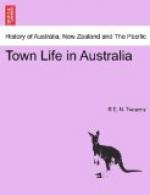The character and behaviour of the members of Australian legislatures have to be considered in forming any just estimate of colonial politics. Unfortunately, the little that is known on the subject at home has revealed neither in a favourable light. The rowdy members and rowdy scenes have ipso facto attained prominence; but after carefully watching for myself, and taking the opinions of those best qualified to form them, I cannot but think that the generally-received opinion even in Australia is incorrect, and that, taking all the circumstances into consideration, both character and behaviour are far better than one has reason to expect. Here, as in many other respects, Victoria is the most pronounced example of what may be called Australianism as opposed to Englishism. Up to the present moment, she is the only Australian colony (I do not count New Zealand) which pays her legislators, and consequently she has at once the cleverest and the worst-behaved set. There are very few members of her parliament who can claim to possess any real political talent. But the general average of native as apart from trained ability, and of clearness in expressing what they wish to say, will—if we except the dozen leading men on each side of the House of Commons—compare with that of the more august assemblage. Nine-tenths of the Victorian members possess at least the gift of the gab. In the excitement of the moment, grammar goes to the winds, and h ’s fall thick as leaves in Vallombrosa, but they neither hesitate nor falter in their speech, and are nearly all possessed of a good deal of useful practical information. Their behaviour is certainly open to exception, but so is that of the House of Commons. The only difference is, that in Melbourne bad behaviour is almost the rule, while at St. Stephen’s it may be considered the exception. Ministers and leaders of the Opposition give each other the lie direct and think nothing of it, and unparliamentary epithets are freely bandied about. At times there have been scenes unsurpassed only in the French Assembly, and one or two members have kept up a continued fire of uncomplimentary interjections. But it is only fair to remember that the great majority of the House belong to the lower middle class, and are found wanting, even if judged by the not very elevated social and educational standard of the colonies. Many of them have risen to their present not very high estate from the lowest class. Amongst people of that kind you cannot expect to find the tone of the House of Commons. The unfortunate members cannot leave the manners and customs of their class in the cloakroom of the House. Besides this, the questions under discussion in Melbourne of late years have been particularly inflammatory. When the appeal has been made from reason to passions on the one side, and to pockets on the other, the debates can hardly be anything but stormy; and if one recollects that most of these encounters take place between the present and the past lower orders, is it astonishing if irony and sarcasm give place to Billingsgate?




